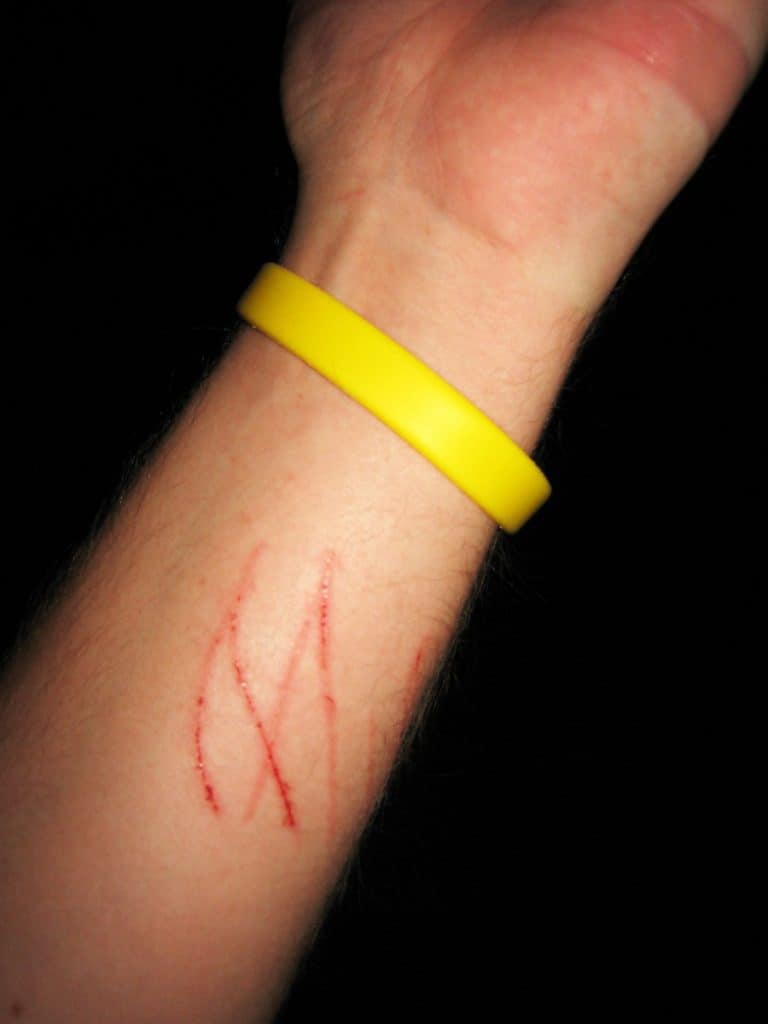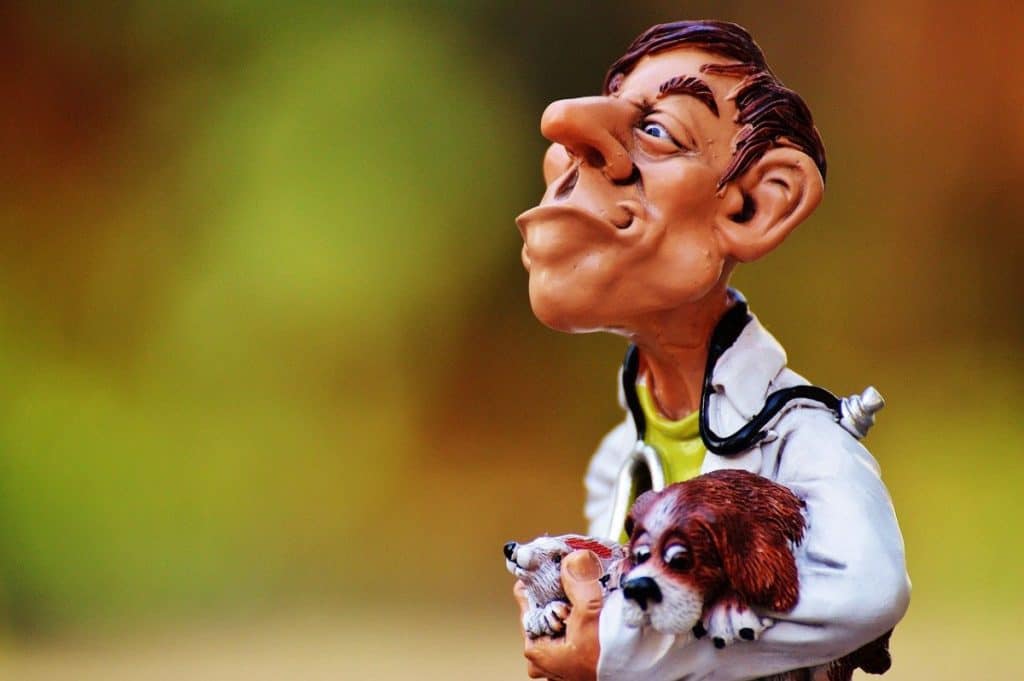Disclosure: We may earn money or products from the companies mentioned in this post.
If you are a new pet rabbit owner, it’s only a matter of time until your bunny becomes scared and kicks to get some much-needed space. If you were holding your bunny when that kicking started, you probably got a rabbit scratch. If you’ve just been scratched by your bunny for the first time, you know it’s a pretty shallow scratch, but does that bunny scratch present any real danger to you?
Rabbit scratches to humans are almost always shallow and rarely harmful. However, rabbit scratches can occasionally become infected and in a rare worst-case scenario, such scratches can transmit bacteria into the shallow wound that can be harmful to humans.
Now let’s take a little time to explore why rabbits sometimes scratch their people and what you should do when your rabbit scratches you.
Why do Rabbits Scratch People?
There are two main reasons why rabbits scratch people. It could be that your rabbit is nervous, or it could be because they’re hormonal. There are ways to minimize and eliminate these risks and I will be discussing them further as we go in-depth into each reason.
1. Fear Caused Flight
Rabbits tend to be more skittish and nervous than dogs or cats. It is very important to remember that rabbits are prey animals. They might have been domesticated for decades but they still retain the prey instinct in their blood.
Like dogs or cats that have to be trained to control their hunting drive, rabbits also need time to control their instincts to flee from predators and other perceived dangerous situations.
We have all experienced the flight or fight response, an uncomfortable animal that can not run away will most likely defend itself, and about the only way a rabbit has of defending itself is kicking with its powerful legs and sharp claws.
However, if your rabbit kicks when she is scared that does not indicate that you have an aggressive rabbit. It just means you have a scared bunny.
Pets need time to bond with their owners. If you find that your rabbit gets nervous when you pick them up, then give them some space and let them have time to become comfortable with their new environment and with you.
I strongly suggest that you don’t try to hold or cuddle with your bunny for at least the first week with your new rabbit. Instead, just be with them so they can bond with you at their own pace.
Rabbits are a huge fan of quiet, together time. Sitting in a room together where the rabbit is allowed to free roam and explore is one of the best ways you can begin to build a connection with your pet bunny.
As your bunny sees that you’re not constantly trying to catch or grab them (which they perceive as predator behavior) they will begin to come over to you to figure out what you are if you’re not a predator. As they learn to trust that you’re not going to act like a predator, they’ll instead decide you must be a friend.
When you reach the bunny friend zone, your rabbit will begin to rub against your leg or hand. Soon that will progress to licks as they groom their friend. And eventually, they will be climbing into your lap for a good nap with a friend.
For families with small children, all bonding time or playtime with pets should be supervised. Children should be made to understand that a bunny is a fragile animal even if they are the same size as your small dog. The proper way to handle rabbits should be taught to children.
Larger rabbit breeds like the Flemish Giants will tend to be less skittish and nervous than smaller breeds like the Netherland Dwarfs. However, temperament may vary from one rabbit to another.
2. Hormone Caused Agression
As rabbits mature sexually, their little bodies are ravaged by hormones (just like us as teenagers). These hormones can make both male and female rabbits territorial and aggressive. Sometimes this hormonal aggression is expressed as kicking or even biting.
Neutering or Spaying your pet rabbits can help control those hormones which will naturally curb scratching or biting aggressive behaviors.
This is true for both male and female rabbits. Both unneutered male rabbits and unspayed female rabbits sometimes become territorial. Aside from biting or scratching, both male and female rabbits that are not fixed will mark their territory by peeing on their territory. Yuck.
Rabbit Urine is a very strong smell and reaks of ammonia, so we strongly encourage you to have your bunnies fixed. This is even more important for male rabbits because the range their urine spraying when marking their territory is awe-inspiring.
Unneutered rabbits would also feel the need to exert their dominance. Rabbits tend to nip at things or other animals to get them out of their way but biting to prove dominance is a commonly observed rabbit behavior. This behavior can be directed to humans too, so it’s better to respect your rabbit’s personal space when they are feeling dominant and keep your other pets from getting too curious.
While neutering or spaying your pet bunnies is not inexpensive, having your rabbit fixed will also be more beneficial to them in the long run as this process eliminates the risk of uterine and reproductive cancers for bunnies.

How Deep Are Rabbit Scratches?
Rabbit scratches are nearly always quite shallow. They are often so superficial that you only have a mark on the top layers of your skin, but sometimes they can break through the skin and actually draw a little blood. I have never seen a rabbit scratch deep enough to require stitches.
How deep a rabbit scratch is largely dependent on how long your rabbit’s nails are. Trimming your rabbit’s nails is an important responsibility for every responsible bunny owner. Long nails for rabbits can be uncomfortable or even harmful to your rabbit and can mean deeper bunny scratches for you.
For a guide on how to properly care for your rabbit’s nails, you may refer to my past article on how to trim your rabbit’s nails.
Do Rabbit Scratches Get Infected?
Rabbit scratches can get infected. However, since rabbits are clean animals, rabbit scratches rarely become infected. If you are smart about cleaning a bleeding rabbit scratch and medicate as needed with over-the-counter antibiotic ointments, rabbit scratches are nothing to worry about.
A sanitary enclosure for your rabbit minimizes the risk of getting an infection when your rabbit does scratch you because it’s much more likely that any infectious material will come from material on your rabbit’s nails, not from the rabbit itself.

Disease And Bacteria From A Rabbit Scratch
There are some bacteria and diseases that you can get from your rabbit when they scratch you, but this is a very uncommon occurrence. Still, you should be aware of potential dangers, no matter how rare, so you can communicate with your veterinarian and your own medical doctor.
If your rabbits have been seen by their veterinarian annually for general health checks, then it’s unlikely that your rabbit has any of these health issues that can also affect humans. Still, you should be aware of the dangers associated with a bunny scratch so that you can be on the watch out and be ready to communicate with your medical professional if concerns arise.
Rabies Transmitted By Rabbits
In researching the risk of rabies in domestic rabbits, I went to the experts; The US CDC and the US NIH.
The CDC clearly states “Small rodents (like squirrels, hamsters, guinea pigs, gerbils, chipmunks, rats, and mice) and lagomorphs (including rabbits and hares) are almost never found to be infected with rabies and have not been known to transmit rabies to humans.”[Source]
However, the National Institute of Health has published a research paper that notes that domestic rabbits are highly susceptible to rabies infection, though it is still very uncommon. The research notes that all known cases of rabies in domestic rabbits happened after exposure to infected raccoons or skunks. The NIH research notes no cases of transfer of rabies from rabbits to humans.[Source]
When the CDC talks about how rabies is transmitted to humans, they say “People usually get rabies from the bite of a rabid animal. It is also possible, but rare, for people to get rabies from non-bite exposures, which can include scratches, abrasions, or open wounds that are exposed to saliva or other potentially infectious material from a rabid animal.”[Source]
So let me summarize what my research found regarding rabies and domestic rabbits.
While domestic rabbits are susceptible to rabies infection, they are almost never found to be infected. All known cases of infection in domestic rabbits have happened after contact with an infected raccoon or skunk. There have not been any cases of rabbits transmitting rabbits to humans.
While it’s possible for rabies to be transmitted to humans through scratches, it’s very unlikely. To transmit rabies through a scratch would require that the scratch be deep enough to draw blood, and then that the scratch be exposed to the saliva of the infected animal.
Nearly all cases of rabies transmission from animals to humans have happened after bites, not scratches.
Then, we need to remember that the CDC tells us that the vast majority of rabies cases in humans come from bites, not from scratches.
The chances of getting rabies from a scratch from your pet rabbit are very unlikely. However, if your rabbit seems unwell in any way, you should talk to your vet and medical doctor asap.
Rabbit Rabies Vaccine
There is no rabies vaccine licensed for use in the United States. As a matter of fact, there are no vaccines licensed for use with rabbits in the US. Other countries have licensed and even required vaccines for rabbits, though to our knowledge no country has a rabies vaccine for rabbits because of the very low risk.
Tularemia Transmitted By Rabbits
In researching Tularemia, I went to the CDC’s Frequently Asked Questions regarding this disease.
Tularemia (also known as Rabbit Fever) is a rare but serious disease that infects wild rabbits throughout the United States and other countries. While it can be transmitted to humans by animal scratches, it can also be transmitted through simple contact with infected animals.
It is very unlikely that your domestic rabbit will have Tularemia unless it has contact with wild animals, including wild rabbits.
Tularemia can be fatal but it is also treatable. This disease can be treated with antibiotics. Since there are so many ways to be exposed to this disease, it is much more likely you’ll catch tularemia while working outside than when scratched by our pet bunny.
Tetanus Transmitted By Rabbits
The CDC tells us that tetanus is caused by a common bacteria that is present all around us, in dust, dirt, poop, and saliva. Tetanus develops when this bacteria gets into open wounds.[Source]
Rabbits are also low-risk carriers of tetanus but they can carry this bacterial toxin. However, you are not at any more at risk of getting tetanus from a rabbit scratch than from any other scratch.
Regardless, you should talk to your medical professional about your tetanus vaccine status. In our family, we get a tetanus shot as suggested by our doctor to avoid worries from every little scratch.
Pasteurella Transmitted By Rabbits
Texas A&M University School Of Veterinarian Medicine tells us that Pasteurella causes a condition in rabbits that is commonly referred to as “Snuffles”.
The snuffles is a very common upper respiratory in rabbits that is present in up to 10% of bunnies with no symptoms and in nearly all bunnies with runny noses, eyes, and demonstrating head tilting. It’s a really common condition that is normally handled easily by a healthy rabbit’s immune system.
If symptoms persist, a visit to your rabbit veterinarian can reliably knock out the snuffles with antibiotics.
Humans can catch the snuffles which is caused by the Pasteurella from their rabbit, though it’s usually transmitted just by handling their infected bunny, and being scratched by a rabbit doesn’t greatly increase your chances of getting the snuffles from your rabbit.
If your rabbit exhibits a runny nose, runny eyes, or seems uncomfortable, take them to your vet. If you’re not feeling good, visit your human doctor.
Rabbit Scratch Treatment
Do not take the list of things to do here as a substitute for medical advice. Instead, this is just me sharing my years of personal experience in treating rabbit scratches at home.
The steps listed below are just some of the first aid actions that you can take when you do get scratched by your rabbit. However, if you still feel that you need medical help, then it is best to see your physician.
1. Keep The Scratch Clean
The rabbit scratch isn’t the danger, but the danger is filth and bacteria that can get into a rabbit scratch or any other open would.
To this end, avoid touching a bleeding rabbit scratch with dirty hands. Also, avoid rubbing an open wound it dirt and filth. 😉
2. Apply Pressure To Stop Bleeding.
While rabbit scratches are often deep enough to break the skin and cause a little bleeding, it’s very uncommon for those bunny scratches to be deep enough to continue bleeding for long.
If your scratch continues to bleed, apply pressure with a clean cloth until the bleeding stops.
Of course, if the bleeding doesn’t stop visit your medical professional. I’ve never seen this happen with a scratch from a rabbit.
3. Clean The Scratch
Once again, it’s not the scratch that causes infection but the bacteria that can get into the scratch, so now it’s time to try to minimize the filth in the wound.
Clean the wound with soap and water to get it as clean as possible and then thoroughly dry the wound with a fresh clean cloth.
4. Document The Scratch’s Appearance
Take a photo of the scratch, this will help you see how the wound progresses as the days go by. Usually, this documentation will just give you peace of mind as the scratch quickly heals, but if you do develop an infection, it will be helpful for your medical professional to be able to see the progression of the wound.
5. Apply Antibiotic Ointment
We apply an over-the-counter antibiotic ointment to all bleeding rabbit scratches or any other bleeding scratches. It’s just a preventative measure and is so easy to do.
You may cover the wound with clean gauze, band-aid, or cloth, but we usually don’t do this unless we’re going to be working in dirt and filth for the rest of the day.
6. Monitor The Wound
Continue to monitor the scratch to make sure it’s healing quickly and well, which is the most likely outcome of a rabbit scratch.
You are watching for expanding redness, swelling, heat, or soreness on and around the wound. If you have any concerns, continue to take daily pictures to document the progression of the wound.
If at any time you experience a fever or if pus (infection) is coming out of the wound, you should contact your physician immediately.
Teaching A Rabbit Not To Scratch
Rabbits are extremely intelligent animals and with great patience comes great outcomes. You can teach your rabbit to not scratch though it’s mostly about teaching your rabbit that it lives in a safe space and that you’re a friend and not a predator.
The golden rule of training is to never discipline your rabbit harshly. Do not hit your rabbit or punish them if they behave badly. Not only will you not get the desired behavior, but your rabbit will also be more scared of you, and like what was mentioned above, a stressed animal might also resort to aggressiveness.
When your rabbit tries to scratch you create a high-pitched noise. This is the same concept used when training dogs.
When animals play together they jump, pounce, kick, and even bite each other. However, playful actions can hurt and animals yip loudly to let their playmates know that they’ve been hurt. This is essentially what you are doing, a high-pitched sound will tell your pet that you’ve been hurt.
Once they stop the behavior that caused you pain (or could potentially cause you pain), you may reward them with their favorite treats. Do this every time your rabbit resorts to painful behavior and eventually, they will figure out that avoiding those unwanted behaviors leads to tasty treats.
________________________________________
I hope I was able to cover all the necessary know-how for dealing with rabbit scratches.
Have you had any personal experiences with rabbit scratches that I didn’t cover in this article? If so, let us know in the comment boxes below!
Or better yet, signup for our bunny friends email list, and drop the Rabbit Pros team an email, and share your story.
~Stacey
